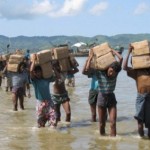Three months after the Rohingya exodus to Bangladesh began in the wake of massive violence in Myanmar’s Rakhine state, the two nations concluded an ‘Arrangement’ in Naypyitaw on 23 November 2017, relating to the return of those who took shelter in Bangladesh.
The agreement resulted from in-depth discussions between A.H. Mahmood Ali, foreign minister of Bangladesh, Myanmar Union Minister U Kyaw Tint Swe and State Counsellor Aung San Suu Kyi. The two governments are expected to form a joint working group by mid-December. The return of Rohingyas or Rakhine Muslims is scheduled to begin within two months i.e. by end January 2018.
According to official figures, 620,000 persons crossed into Bangladesh since end August 2017. A verification process will govern their return: Bangladesh wants all recent entrants to return, but Myanmar is willing to accept only those who establish themselves as residents.
The Rohingya crisis attracted considerable international attention. The subject was discussed at a special meeting of the UN Security Council. While participating in the UN General Assembly session, Prime Minister Sheikh Hasina suggested, on 21 September, a five-point proposal to resolve the complex issue, namely: immediate end of violence in the Rakhine state; dispatch of a UN fact-finding mission to Myanmar; protection of people through the creation of UN-supervised safe zones; sustainable return of all Rohingyas; and full implementation of the recommendations made by the Kofi Annan Commission.[1]
Earlier, facing intense criticism from human rights groups and many governments, Aung San Suu Kyi broke her silence through a diplomatic briefing that set out Myanmar’s perspective. She voiced condemnation of “all human rights violations” and “unlawful violence” and conveyed willingness to accept the Rohingyas’ return, subject to verification, of those who had left the province.[2] While her address evoked further negative reaction internationally for its ambivalence, it received much support at home. It was a calibrated endeavour to balance domestic and external imperatives.
It is now evident that the agreed bilateral arrangement on the Rohingyas’ return is closer to Myanmar’s position than Bangladesh’s. Barely two months ago, it seemed as if Bangladesh had an upper hand, but its diplomacy lost steam, perhaps because the international community showed little solidarity and stamina in demanding firm action on the immediate and full return of displaced persons.
The western camp and ASEAN remain distracted and divided. The United States, at first, took the line that it was not appropriate to consider imposing sanctions, but after Secretary of State Rex Tillerson’s recent visit to Myanmar, a new assessment emerged in Washington: military authorities committed “ethnic cleansing against the Rohingya” and, therefore, accountability, including targeted sanctions, will be pursued.[3]
EU member-states were content, urging Myanmar to take back the Rohingyas and create suitable conditions for their return. The Pope, currently visiting Myanmar, took care to refrain from using the ‘R’ word.
As for ASEAN, the chairman’s statement on the grouping’s recent Manila Summit, running into 144 paragraphs, had no mention of the Rohingya issue!
China was active in conveying its firm support for Myanmar – in conformity with its long-time policy of backing peace and stability for its southern neighbour. But in the face of the unhappiness that resulted in Bangladesh, Beijing managed to create the impression of being a fair-minded mediator through Foreign Minister Wang Yi’s diplomatic overtures. His three-point formula – comprising ceasefire, bilateral resolution of the refugee issue, and addressing the long-term problem of poverty and underdevelopment – was, according to observers, more posturing and less mediation. My visit to Dhaka last week confirmed this reading.
Further, China intends to persevere in leveraging the new opportunities, created by the Rohingya crisis, to further consolidate its ties with Myanmar. President Xi Jinping plays a direct role in this process. He received Myanmar’s Commander-in-Chief Min Aung Hlaing in Beijing on November 21, underlining China’s support. Latest reports indicate that State Counsellor Suu Kyi plans to visit Beijing shortly when she is likely to continue her dialogue with China’s top leaders. In contrast, Bangladesh does not enjoy the luxury of frequent interaction with the Chinese leadership.
On the Rohingya issue, India took a principled and pragmatic position, extending generous human assistance to both sides (probably more than any other country), urging them to resolve the issue through dialogue, supporting the Kofi Annan Commission recommendations, and conveying readiness to contribute to the long-term economic development of the Rakhine region. New Delhi should publicise more effectively its measured policy line, both in Bangladesh and Myanmar. As for its anxiety about the deepening cooperation between China and Myanmar, it should take into confidence its Quad partners and like-minded ASEAN countries.
The problem of the Rohingya refugees may not be resolved in a hurry. It is a bold analyst who predicts that at least half of them will return to Myanmar by mid-2018.
Rajiv Bhatia is Distinguished Fellow, Gateway House. A former ambassador to Myanmar, his book ‘India-Myanmar Relations: Changing contours’ has received critical acclaim.
You can read exclusive content from Gateway House: Indian Council on Global Relations, here.
For interview requests with the author, or for permission to republish, please contact outreach@gatewayhouse.in.
© Copyright 2017 Gateway House: Indian Council on Global Relations. All rights reserved. Any unauthorized copying or reproduction is strictly prohibited
References
[1] General Assembly, United Nations, H.E. Ms. Sheikh Hasina, Prime Minister, (New York: General Assembly, September 2017)
[2] State Counsellor Office, Government of Union of Myanmar, State Counsellor: ‘Myanmar Does not fear world scrutiny’, (Naypyidaw: State Cousellor Office, September 2017)
[3] U.S. Department Of State, Government of The United States, Efforts To Address Burma’s Rakhine State Crisis (Washington: U.S. Department of State, November 2017)


